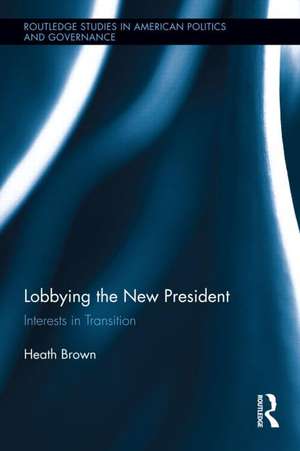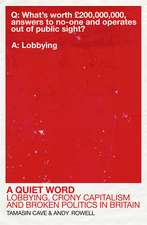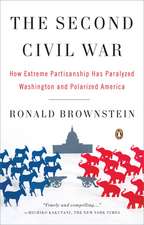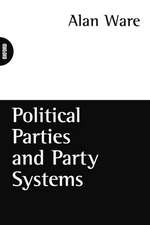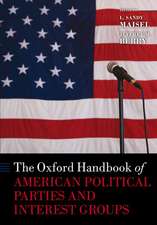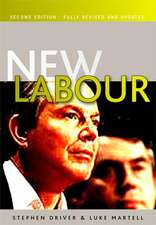Lobbying the New President: Interests in Transition: Routledge Research in American Politics and Governance
Autor Heath Brownen Limba Engleză Hardback – 29 mai 2012
Using an innovative mixed methodology integrating a historical analysis of original documents, original interviews with over 40 interest group leaders and transition leaders, a survey of 300 interest groups and content analysis of 300 interest group letters, Lobbying the New President uncovers the politics of interest group influence during Presidential transitions. In doing so, Heath Brown asks:
- Was the role played by Heritage in 1980 and CAP in 2008 indicative of a pattern of influence during the transition phase?
- Or have Presidents effectively shielded themselves from outside influence at the earliest point of their time in office?
- What can we learn about the larger study of interest groups and the Presidency from a focus on the transition phase?
| Toate formatele și edițiile | Preț | Express |
|---|---|---|
| Paperback (1) | 383.12 lei 6-8 săpt. | |
| Taylor & Francis – 10 noi 2014 | 383.12 lei 6-8 săpt. | |
| Hardback (1) | 1162.84 lei 6-8 săpt. | |
| Taylor & Francis – 29 mai 2012 | 1162.84 lei 6-8 săpt. |
Din seria Routledge Research in American Politics and Governance
-
 Preț: 317.04 lei
Preț: 317.04 lei - 8%
 Preț: 383.74 lei
Preț: 383.74 lei -
 Preț: 311.41 lei
Preț: 311.41 lei -
 Preț: 310.31 lei
Preț: 310.31 lei -
 Preț: 251.32 lei
Preț: 251.32 lei -
 Preț: 231.89 lei
Preț: 231.89 lei - 29%
 Preț: 706.27 lei
Preț: 706.27 lei -
 Preț: 362.05 lei
Preț: 362.05 lei -
 Preț: 365.32 lei
Preț: 365.32 lei - 18%
 Preț: 999.51 lei
Preț: 999.51 lei -
 Preț: 381.21 lei
Preț: 381.21 lei -
 Preț: 94.48 lei
Preț: 94.48 lei - 26%
 Preț: 847.31 lei
Preț: 847.31 lei -
 Preț: 358.62 lei
Preț: 358.62 lei - 31%
 Preț: 766.42 lei
Preț: 766.42 lei - 18%
 Preț: 1058.52 lei
Preț: 1058.52 lei -
 Preț: 227.86 lei
Preț: 227.86 lei -
 Preț: 487.37 lei
Preț: 487.37 lei - 18%
 Preț: 1000.27 lei
Preț: 1000.27 lei -
 Preț: 385.08 lei
Preț: 385.08 lei - 18%
 Preț: 1058.79 lei
Preț: 1058.79 lei -
 Preț: 369.73 lei
Preț: 369.73 lei -
 Preț: 493.12 lei
Preț: 493.12 lei -
 Preț: 385.84 lei
Preț: 385.84 lei -
 Preț: 383.12 lei
Preț: 383.12 lei - 18%
 Preț: 728.79 lei
Preț: 728.79 lei -
 Preț: 460.47 lei
Preț: 460.47 lei - 26%
 Preț: 849.48 lei
Preț: 849.48 lei - 18%
 Preț: 1004.20 lei
Preț: 1004.20 lei -
 Preț: 480.62 lei
Preț: 480.62 lei - 18%
 Preț: 1009.60 lei
Preț: 1009.60 lei -
 Preț: 381.98 lei
Preț: 381.98 lei -
 Preț: 365.69 lei
Preț: 365.69 lei -
 Preț: 230.75 lei
Preț: 230.75 lei
Preț: 1162.84 lei
Preț vechi: 1418.10 lei
-18% Nou
Puncte Express: 1744
Preț estimativ în valută:
222.54€ • 231.47$ • 183.72£
222.54€ • 231.47$ • 183.72£
Carte tipărită la comandă
Livrare economică 14-28 aprilie
Preluare comenzi: 021 569.72.76
Specificații
ISBN-13: 9780415808521
ISBN-10: 0415808529
Pagini: 218
Ilustrații: 20 black & white line drawings
Dimensiuni: 152 x 229 x 15 mm
Greutate: 0.43 kg
Ediția:1
Editura: Taylor & Francis
Colecția Routledge
Seria Routledge Research in American Politics and Governance
Locul publicării:Oxford, United Kingdom
ISBN-10: 0415808529
Pagini: 218
Ilustrații: 20 black & white line drawings
Dimensiuni: 152 x 229 x 15 mm
Greutate: 0.43 kg
Ediția:1
Editura: Taylor & Francis
Colecția Routledge
Seria Routledge Research in American Politics and Governance
Locul publicării:Oxford, United Kingdom
Public țintă
PostgraduateCuprins
1. The Call for the Book 2. Defining Interest Groups, Exploring Policy Theory 3. Institutional Transition Pluralism 4. Interest Group Strategy: Cataloguing Transition Tactics 5. The Obama Transition: Modeling Activity with Survey Research on Interest Group Strategy 6. Linking Strategy to Outcomes 7. Advising the New President: Content Analysis of Issue Framing and Advice 8. Assesment, Evaluation, and Future Research
Recenzii
"This is the most in-depth description of presidential transitions ever written. It does not only attain a high academic standard for accuracy but due to its practicality it will become a bible for every lobbying organization in Washington D.C. for years to come."
—Raymond Scheppach, University of Virginia, former Executive Director of the National Governors Association
"Most research on presidential transitions has ignored interest groups and the scholarship on interest groups has omitted an analysis of their influence on presidential transitions. Lobbying the New President remedies this through a unique and important contribution to an understanding of the inside role of lobbyists, interest groups and think tanks in shaping presidential transitions. Brown uses innovative multi-method social science research to reveal the important role of interest groups and lobbyists in modern presidential transitions."
—James A. Thurber, American University
"Heath Brown’s study of the role that interest groups play during presidential transitions, from staffing the administration to setting the president’s policy agenda, is a much-needed addition to the growing literature on how decisions are made by the incoming president and advisors between Election Day and the inaugural."
—Lori Cox Han, Chapman University
"This is an important book on a very consequential topic. Heath Brown provides the definitive account to date concerning the activities and impact of interest groups during presidential transitions. The book is readable, well-documented, and an important contribution to understanding this crucial period for a presidency as well as the role of interest groups in our politics."
—John P. Burke, University of Vermont
"This book is well written, thoroughly researched, and interesting. It manages both to fill a significant scholarly gap and to connect disparate literatures. It will appeal primarily to scholars of interest groups and lobbying, but it will also be of interest to scholars of the presidency and American politics more generally." - Graham G. Dodds, Concordia University"Brown provides a useful contribution that sheds light on a neglected area of study and does much to augment the limited data available for analysis." - Emily J. Charnock, University of Virginia
—Raymond Scheppach, University of Virginia, former Executive Director of the National Governors Association
"Most research on presidential transitions has ignored interest groups and the scholarship on interest groups has omitted an analysis of their influence on presidential transitions. Lobbying the New President remedies this through a unique and important contribution to an understanding of the inside role of lobbyists, interest groups and think tanks in shaping presidential transitions. Brown uses innovative multi-method social science research to reveal the important role of interest groups and lobbyists in modern presidential transitions."
—James A. Thurber, American University
"Heath Brown’s study of the role that interest groups play during presidential transitions, from staffing the administration to setting the president’s policy agenda, is a much-needed addition to the growing literature on how decisions are made by the incoming president and advisors between Election Day and the inaugural."
—Lori Cox Han, Chapman University
"This is an important book on a very consequential topic. Heath Brown provides the definitive account to date concerning the activities and impact of interest groups during presidential transitions. The book is readable, well-documented, and an important contribution to understanding this crucial period for a presidency as well as the role of interest groups in our politics."
—John P. Burke, University of Vermont
"This book is well written, thoroughly researched, and interesting. It manages both to fill a significant scholarly gap and to connect disparate literatures. It will appeal primarily to scholars of interest groups and lobbying, but it will also be of interest to scholars of the presidency and American politics more generally." - Graham G. Dodds, Concordia University"Brown provides a useful contribution that sheds light on a neglected area of study and does much to augment the limited data available for analysis." - Emily J. Charnock, University of Virginia
Notă biografică
Heath Brown is an Assistant Professor in the Department of Public Management at John Jay College, City University of New York.
Descriere
Using an innovative mixed methodology integrating a historical analysis of original documents, original interviews with over 40 interest group leaders and transition leaders, a survey of 300 interest groups and content analysis of 300 interest group letters, Lobbying the New President uncovers the politics of interest group influence during Presidential transitions. In doing so, Heath Brown asks:
- Was the role played by Heritage in 1980 and CAP in 2008 indicative of a pattern of influence during the transition phase?
- Or have Presidents effectively shielded themselves from outside influence at the earliest point of their time in office?
- What can we learn about the larger study of interest groups and the Presidency from a focus on the transition phase?
